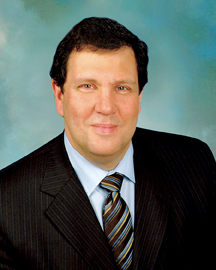Kenneth Weissenberg of EisnerAmper on Carried Interest and What’s at Stake
By Daniel Geiger March 28, 2012 4:00 pm
reprintsSince at least the early 2000s, carried interest, or the share of profits of an investment paid to an investor in excess of what he contributes to a partnership, continues to be a hot topic among not only real estate owners but hedge fund managers and private equity managers alike. Kenneth Weissenberg, a partner at EisnerAmper, spoke to The Commercial Observer about what commercial real estate owners should expect as the issue courses through Congress this year.

The Commercial Observer: Is carried interest the big issue now in the tax and accounting fields?
Mr. Weissenberg: There have been various legislative proposals to tax carried interest as ordinary income for around 10 years now but it has gained a lot of traction recently with the Warren Buffet piece, which explained how he benefits from it, receiving his income at the dividend tax rate of 15 percent. Mitt Romney is the same deal as he gets his income from returns on his investments. There are fears among real estate investors who do their investing in these partnerships that they’re going to have to pay ordinary tax rates.
How do partnerships where someone is now subject to a higher tax on carried interest work?
It’s where the developer has know-how and puts up zero capital and has investors put up the seed money—let’s say $10 million. The investor would put in his experience and once the partners receive a return then the investor sees 20 percent of anything that’s made beyond that. Already, those guys are getting squeezed, where they’re allowed to take a lesser percentage—just by the market forces alone.
So how would it all change?
Under the tax structure currently, those guys get taxed at 15 percent and they’re not subject to self-employment tax. Under the proposal, it would be as if he received a fee and that fee would be taxed at the top rate, which right now is about 35 percent and is proposed to go up to 39.6 percent when the Bush tax cuts expire. Add the self-employment tax and other taxes and you have something around 42.5 percent, which is hefty.
So will this change the way investors invest?
The law hasn’t been written, but transactions can likely be structured outside of it. It could all be done as a loan, for instance.
How would that work?
Let’s go back to the $10 million deal. A bank will lend maybe $6 million of that. The investor needs $4 million more. Maybe he can put in $1 million by himself. That’s $3 million short. If he gets that capital from the investors, maybe he could take it as loan. Something could be structured in that way because the repayment of a loan is a different tax consequence.
Are your clients concerned about higher taxes?
Sure. But most are more concerned with making money than with how much taxes they’ll have to pay. Right now, the rules have been very favorable to the real estate community. Owners have been allowed 100 percent deductions on leasehold improvements. If you leased space to a tenant and it cost you $50 a foot to build the space, you have a tax deduction for the whole amount.
Was it like that last year?
No, sometimes it’s a 39-year amortization schedule to the deductions.
Why was it so good this year?
Congress wants to influence behavior. They made an incentive for people to buy equipment and do leasehold improvements to expand the economy.
What implications does the election hold for all of this?
I don’t know if it has any direct impact on the real estate community as a whole. I don’t believe neither party won’t raise taxes. The government can’t run at a deficit forever. No matter who is elected there’s going to be changes in the tax law with this many expiring tax cuts.



